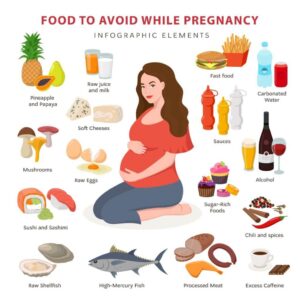Healthy Weight Gain in Pregnancy – How Much is too Much
 30456
30456

super easy
Pregnancy is undoubtedly the most beautiful journey that a woman embarks on. It seems surreal that the female body can nurture a tiny human being that grows into a beautiful, healthy baby. Over these nine months, women typically gain somewhere between 11 to 16 kilograms. Most women gain 2 kilograms in their first trimester, then 500 grams per week over the second and third trimester. Excess weight gain during pregnancy can lead to many complications during pregnancy and childbirth and can affect the baby’s immediate and long-term health. To have a smooth and healthy pregnancy, it is essential to adhere to the daily calorie intake meant for expecting women. Firstly, this means dropping the “eating for two” approach. The idea that you are eating for two during pregnancy leads you to overeat. Many women use this as an excuse to indulge in fattening foods, which may happen without them even realizing it. The fetus takes its nutrition from whatever you eat. A slight increase in appetite is average, but you need to make healthy choices to satiate yourself. Therefore, an expectant mother needs to eat healthily and even follow a pregnancy diet chart, if required. A general rule of thumb for calories during pregnancy would be the following:
1.First Trimester– no extra calories (for an average woman, that means 1800 calories per day)
2. The Second Trimester– add an extra 300 (2100 calories per day)
3. The Third Trimester– add an extra 500 (2300 calories per day)
Keep in mind that this is a general guideline and may not always apply on an individual basis.
Here are some more tips for maintaining a healthy weight gain during pregnancy:
1. Stay Physically Fit:
Expecting women should diligently follow a fitness routine with moderate-intensity activity, approved by the gynecologist. Swimming and walking are the safest form of exercise for pregnant women. Prenatal yoga is another excellent way to remain fit during pregnancy. It can also improve sleep, decrease lower back pain, and reduce anxiety. More importantly, prenatal yoga helps with both the physical and emotional endurance needed for childbirth by encouraging mental centering, focused breathing, and stretching.
2. Make Healthy Choices:
It’s essential to include various fresh fruits and vegetables in one’s daily diet to meet the baby’s nutrient needs and maximize prenatal nutrition. Sources of protein and at least 3 servings of dairy (to meet calcium needs) should be included in the diet every day. Whole-grain foods such as cereals, crackers, and slices of bread are also preferred over refined options. You can also ask your obstetrician for a diet plan for pregnant women. This should make it easier for you to plan your meals and ensure a healthy diet for you and the baby.

3. Control Sugar Intake:
High sugar consumption not only adds empty calories but leaves pregnant women feeling more tired. This can easily lead to a lack of necessary activity and further increases the likelihood of weight gain. During pregnancy, excess sugar intake increases the risk of pre-eclampsia and the risk of pre-term delivery. As the developing baby consumes everything the mother consumes, it is important to limit foods and drinks with added sugar or contain artificial sweeteners. Too much can negatively impact the baby’s brain development. Low sugar intake will help in keeping your blood sugar levels stable and allow for healthy weight gain.
4.Eat the Right kind of Fats:
Fats are essential to a growing baby’s brain and eye development, so it’s important to distinguish between those that should or shouldn’t be eaten during pregnancy. Unsaturated fats are great (nuts, avocados, and plant-based oils) and should be included in your diet. Saturated fats are great in moderation (dairy and meats). one should avoid Trans fats (baked goods such as cakes and cookies, fried foods, ice creams).

5. Stay Physically Fit:
It is crucial to increase water and fluids intake during pregnancy to meet the bodies’ requirements– remember the amniotic sac is primarily made up of water! This will help with the feeling of fullness and reduce the risk of urinary tract infection and pre-term labor. It is essential to enjoy this precious time with a mindful attitude towards diet and exercise to make this journey to motherhood smooth and easy.
You can consult a nutritionist along with your obstetrician to guide you towards a healthy lifestyle. Your nutritionist can give you a pregnancy diet chart or a diet plan meant for pregnant women. This will help you consume the correct number of calories for you and the fetus and not overeat. A good and healthy weight gain is significant during pregnancy. This also makes it easier for you to lose weight post-delivery. The best way to do this is to be mindful of what you eat and to follow a pregnancy diet chart.
Follow us-
Instagram/ Facebook/ Youtube/ Pinterest
Also Read:
Yogshala for to be Mom’s to Be – Importance of Prenatal Yoga
Reading to your Baby in the Womb? Congratulations on the head start!
You May Also Like:
:





Leave a Reply